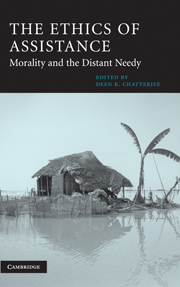1 - Introduction
Published online by Cambridge University Press: 05 June 2012
Summary
This collection of chapters seeks to describe our duties to help those who are in need but who are strangers to us due to distance – physical or otherwise. If we have duties and obligations toward each other in everyday moral contexts, should these duties be extended to the distant needy? If so, what should be the nature and role of institutions implementing such duties beyond our own borders of special ties and communities? Though moral philosophers have pondered these questions in the past, such issues have recently become the focus of especially intense debate. Today we live in a world in which spheres of interaction are constantly expanding, while advanced technology makes it easy to reach the distant needy and vividly broadcast their plight to all. In parallel with the growth of these global relationships, there has been an enormous increase in ethicists' interest in questions regarding the morality of affluence in a world of poverty and the individual's response to it. In addition to creating new perspectives on individual moral obligation, this discussion is transforming political philosophy. While the initial florescence of interest in theories of justice that began with John Rawls' A Theory of Justice (1971) solely concerned relationships among fellow-citizens, theorists of social justice now frequently attend to issues of global inequity and institutional responses to it.
Peter Singer's seminal article “Famine, Affluence and Morality” (1972) has been a central focus of debate over the individual's obligation to respond to the distant needy.
- Type
- Chapter
- Information
- The Ethics of AssistanceMorality and the Distant Needy, pp. 1 - 8Publisher: Cambridge University PressPrint publication year: 2004
- 5
- Cited by

